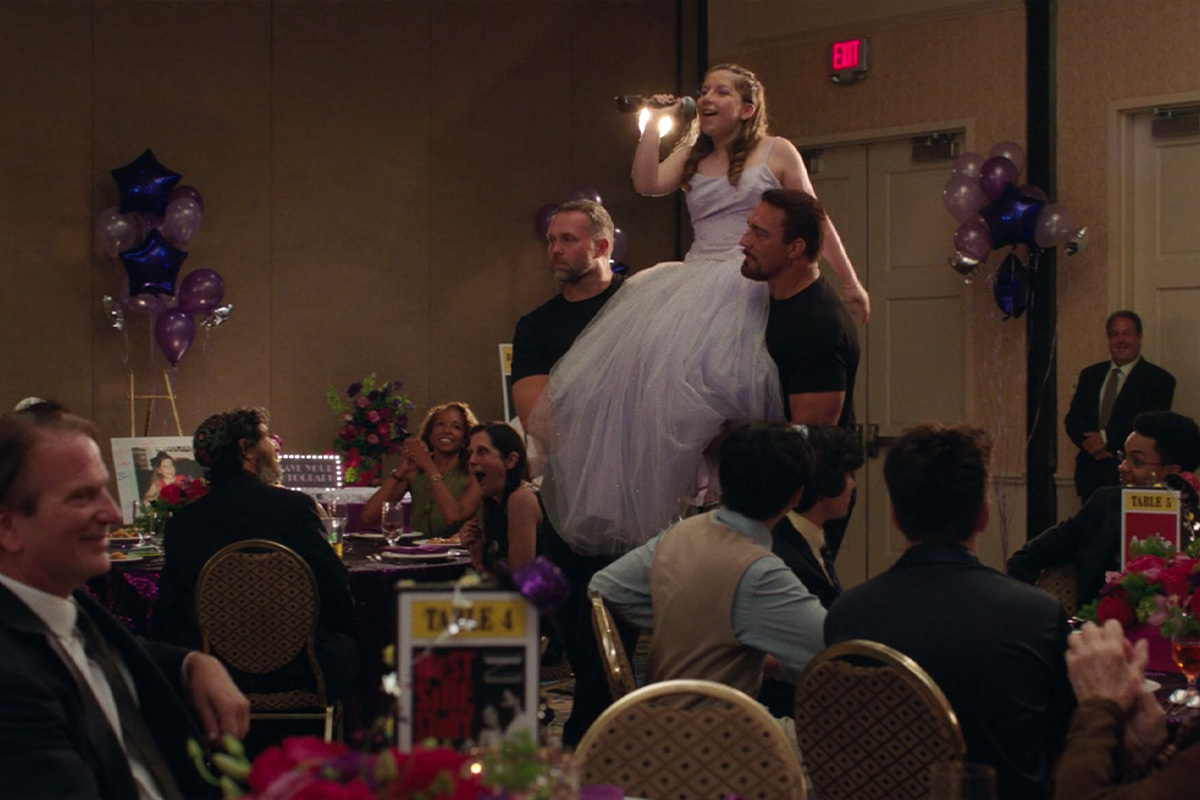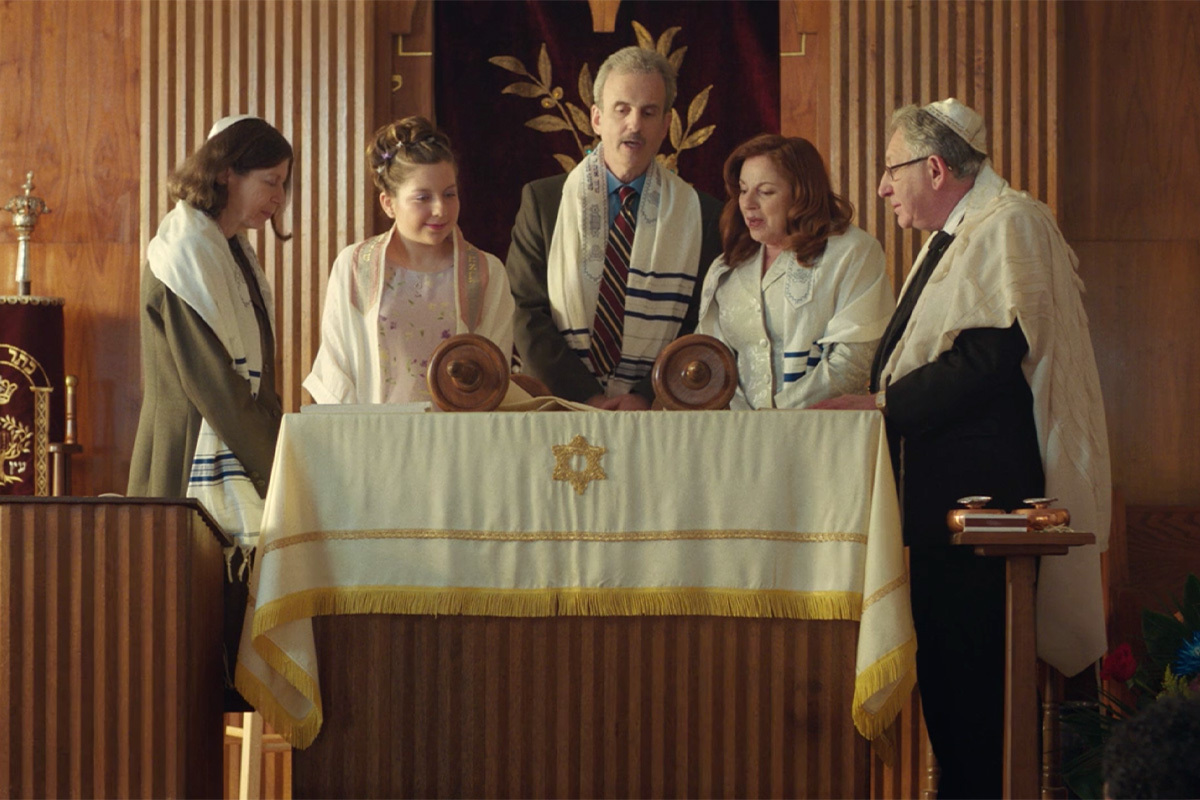If we’re lucky, there comes a time in life when we see ourselves — our story, our experiences — so perfectly captured in a work of art that we’re reminded that, despite the loneliness or isolation we feel at times, we are not alone on this earth — that others, too, have been in our shoes. For me, that moment came during the season two part two premiere of “Pen15,” in an episode called “Bat Mitzvah.”
I knew from the title alone that this episode would be for me. The middle school comedy from Hulu, in which co-creators Maya Erskine and Anna Konkle play 13-year-old versions of themselves amongst a cast of actual teenagers, is one of my favorite shows of the past few years for the uncanny way it captures that particular cocktail of seventh grade feelings: longing, insecurity, feeling like a little kid and a burgeoning adult at the same time, always having something stuck in your braces. The fact that it takes place in 2000, just one year after I myself was in seventh grade, means that all the cultural touchstones feel deeply real to me, from butterfly hair clips to Tamagotchis. But one aspect of my life it hadn’t yet broached was the Jewish part — which, especially during seventh and eighth grade, took up a huge portion of my social schedule.
Which brings me to “Bat Mitzvah.” The episode revolves around Anna and Maya’s classmate, Becca Roth’s, bat mitzvah. It’s framed by a history lesson about World War II, during which Maya admits, “Oh my God, I feel, like, so bad for the Jewish people in World War II,” and Anna has an emotional reaction compounded by overwhelming feelings over her parents’ divorce. Becca, a popular girl who is mostly mean to Maya and Anna with a few exceptions throughout the series, uses the lesson as a time to remind the class that her bat mitzvah is coming up, and everybody is invited but they better RSVP.
Early in the episode, we get a touching moment after Anna questions the existence of God, in which the music swells and Becca divulges, “You guys, I feel like it’s because we survived the Holocaust that so many of us have faith today. Like, it’s this feeling I get when I’m in temple, that despite all the odds being stacked against me and my ancestors, we survived. And that’s how I know God exists. There are signs around me every day. It’s kind of beautiful.” And then, because this is “Pen15” and not “Full House,” Becca adds, “On a more serious note, if you guys park in front of the temple on my bat mitzvah, my dad will have to tow you, so do not do that, OK?”
What follows during the rest of the episode is so many ridiculously on-point details of a very specific brand of over-the-top American bat mitzvah party that I have to wonder if one of the writers actually attended my own Mollypalooza in 1999, or at least Googled around and found this article I wrote about it. Like Becca, I, too, made my grand entrance to the party carried on the shoulders of two burly male DJ dancers dressed in black. We both rocked the exact same updo. While I decided to steal the spotlight (which was, of course, already on me, it was my own bat mitzvah) with a dance performance to Will Smith’s “Welcome to Miami,” Becca chooses to show off her pipes with a vocal performance of “Whatever Lola Wants” from “Damn Yankees.” Glow sticks abound. Line dancing to “Electric Slide” gets everyone on the dance floor. “I Swear” by All-4-One (they just don’t name bands like they used to) gives the children the perfect opportunity to slow dance while holding their arms straight out and awkwardly rocking.

And in the biggest jaw-dropping moment for me personally, Becca also had a Dippin’ Dots station at her bat mitzvah. When it comes to the ice cream of the future, Maya goes for “strawberry nanners” (I personally was a rainbow girl myself).
Like any successful bat mitzvah party, the episode also features at least one guest crying, a few kids sneaking sips of alcohol outside and glow-in-the-dark hats.
But what makes this episode an actually incredible moment of authentic Jewish representation on TV, and not just a fun walk down strobe light lane, is the focus given to the service itself. We see Becca’s parents up on the bimah to receive their aliyah, during which they enunciate every Hebrew word in the very specific way that Jewish parents who are not fluent in Hebrew do. We see an older male rabbi dabbing his nose with a handkerchief and a younger female cantor watching with pride. And we see Becca draped in her new tallit, standing in front of the open Torah scroll.
The real show-stopper moment comes during the ending credits, when Becca flawlessly sings the blessing after the Haftarah. In true Becca fashion, she takes this opportunity for a solo and runs with it, adding Mariah Carey-esque runs to it — something that any Jewish child with even some semblance of pitch and a healthy dose of confidence can be found doing on their special day. She nails her last note, only to be met with the out-of-sync grumbling “amens” from the rest of the congregation.
For those wondering, Sami Rappaport, the 17-year-old actress who plays Becca, is Jewish, though she didn’t have a bat mitzvah in real life. After I gushed about her performance on Twitter, she responded, “I’m half Jewish and didn’t have my own Bat Mitzvah… I don’t know any Hebrew so I learned it off of a YouTube video,” adding, “I’m so glad at least I got a tv one.” I’m no rabbi, but I think this TV bat mitzvah definitely counts for something.
All in all, “Bat Mitzvah” is a perfect episode from a perfect series. It touches on both the sanctity and silliness of the rite of passage in which a young Jewish person becomes an “adult” while still clearly in the midst of their adolescence. And it nestles Dippin’ Dots and party dresses right up against storylines that explore faith, trauma and tradition. I’d like to think that one day, Becca will watch the footage from her bat mitzvah (which will have to be transferred from VHS tape to DVDs; call me, I know a guy). She’ll shake her head in embarrassment and amazement at her grand entry into the world of Jewish adulthood, like I have done so many times — because, as “Pen15” knows well, looking back in horror on your coming-of-age is as much a rite of passage as the event itself.
Cue Sister Sledge’s “We Are Family.”



